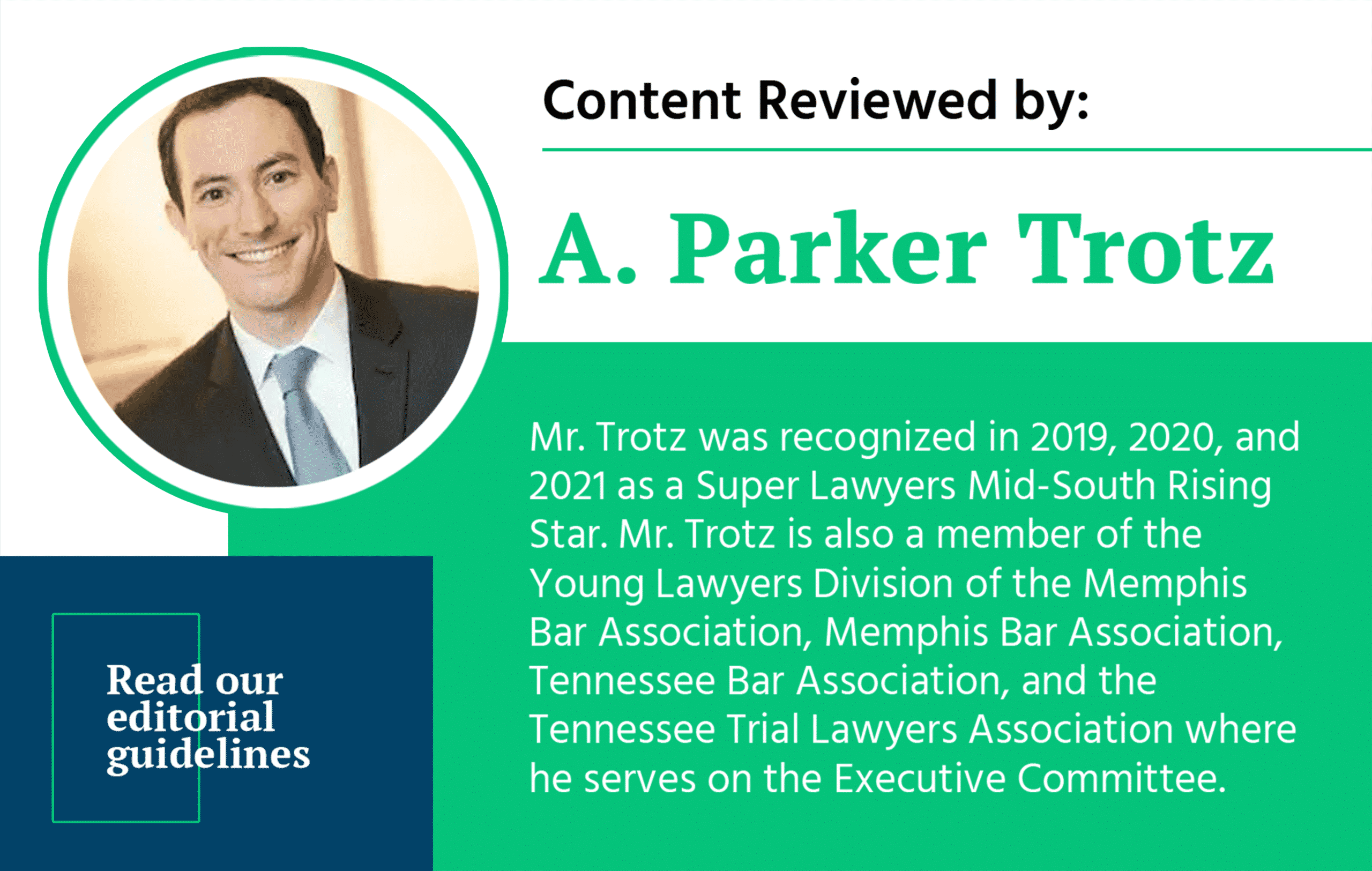Home » Memphis Personal Injury Lawyers » Memphis Premises Liability Lawyers » Slip and Fall Accidents
Slip and Fall Accidents
Mr. Trotz was recognized from 2019-2024 as a Super Lawyers Mid-South Rising Star. Mr. Trotz is also a member of the Young Lawyers Division of the Memphis Bar Association, Memphis Bar Association, Tennessee Bar Association, and the Tennessee Trial Lawyers Association where he serves on the Executive Committee. READ OUR EDITORIAL GUIDELINES
Mr. Trotz was recognized from 2019-2023 as a Super Lawyers Mid-South Rising Star. Mr. Trotz is also a member of the Young Lawyers Division of the Memphis Bar Association, Memphis Bar Association, Tennessee Bar Association, and the Tennessee Trial Lawyers Association where he serves on the Executive Committee. READ OUR EDITORIAL GUIDELINES
Premises Liability Lawyers Fighting for Victims Injured in Memphis and Beyond
Premises liability is an area of the law that covers a wide variety of situations. In general, these cases involve an injury suffered on property owned or managed by a third party. Out of all of the types of premises liability cases that arise under the law, slip and fall accidents are perhaps the most well-recognized. As the name implies, slip and fall accidents occur when a dangerous or unsafe condition causes a person to lose their footing and fall, suffering injury as a result. Depending on the circumstances of the fall, the injured individual may be able to hold the owner of the property liable for their medical bills, pain and suffering, lost wages, and other losses caused by the fall. If you have a case that you would like to discuss with an experienced Memphis slip and fall lawyer, contact Nahon, Saharovich & Trotz today. As the largest personal injury law firm based in Tennessee, we have over 30 attorneys and more than 120 support staff members who are ready to help you pursue the compensation you deserve.
Holding Negligent Premises Owners Accountable
Liability for injuries sustained in slip and fall accidents, similar to other areas of personal injury law, will often be analyzed under the legal framework of negligence. Negligence claims require injured plaintiffs to prove the following legal elements: duty, breach, causation, and damages. In Tennessee, for example, property owners have a legal duty to act in a manner that is reasonable under the circumstances. Breach of this duty is often established by showing that a property owner created a dangerous condition or had notice of a dangerous condition but failed to take reasonable steps to address the situation or make it safe. Examples of dangerous conditions that can give rise to slip and fall liability include:
- Wet floors
- Leaking coolers or freezers
- Poorly lit or maintained stairs
- Broken steps
- Improperly maintained parking lots
- Rotten floorboards
- Sudden and unexpected raises or drops
- Objects or equipment left lying around
One can slip and fall almost anywhere, and it is estimated that slip and falls account for over 1 million emergency room visits each year in the United States alone. Common personal injury claims arising out of a slip and fall occur at commercial establishments like restaurants, grocery stores, big box department stores, shopping malls, construction sites, arenas, salons, and public places. They may also occur at another person’s home or inside of an apartment complex. A slip and fall lawyer can help Memphis residents bring a claim in any of these situations. Victims can sustain critical injuries, like broken bones (arm, wrist, leg, ankle, hip, etc.) that require surgery and physical therapy.
No matter how or where the injury occurred, proof of the dangerous condition is always critical in premises liability cases. Establishing actual or constructive notice can also go a long way in building your case. Proof can come in many forms, including photographs, video footage, witness statements or testimony, incident reports, and more. Injured victims should take photographs of the scene and area in which they fell, obtain contact information of witnesses, and request a copy of the incident report from the business or location of the fall.
By consulting with an experienced slip and fall attorney in the Memphis area, injured victims can put themselves in the best position for obtaining the evidence they need to prove their case and successfully obtaining recovery for their losses. One step could include sending the property owner a letter demanding preservation of evidence. If spoliation of evidence occurs, critical documentation, such as camera footage, may be altered, lost, or destroyed in the ordinary course of business, making it important to begin the process of investigating a fall as soon as possible. The skills of an attorney experienced in slip and fall cases will also be invaluable for defending against accusations by the defendant property owners and their insurers that may attempt to place blame on the injured victim. Legal issues could also arise as to whether the injured victim would be considered an invitee, licensee, or trespasser.
Discuss Your Slip and Fall Accident with an Experienced Injury Attorney
If you have been injured in a slip and fall accident, the Memphis slip and fall attorneys of Nahon, Saharovich & Trotz are ready to assist you in pursuing recovery against those who are responsible for your injuries. Over the last 30 years, our firm has successfully recovered over $1.5 billion in compensation for our injured clients through jury verdicts, judgments, and settlements. We serve those in Memphis, Knoxville, Chattanooga, Nashville, Jackson, Meridian, Tupelo, Oxford, Starkville, Columbus, Grenada, Hayti, Caruthersville, Little Rock, Jonesboro, and other cities across Tennessee, Mississippi, Kentucky, Missouri, and Arkansas. Call us today at 800-529-4004 or fill out our online form to set up your free consultation with a slip and fall attorney. Let us show you why NST is the way to go.


